A tale of two camps: How similar protests were received differently in Saskatchewan and Alberta
In the last week of February 2018, Indigenous protest camps popped up in both Calgary and Regina.
Both were initially inspired by the acquittals of Gerald Stanley and Raymond Cormier in the Colten Boushie and Tina Fontaine murder trials.
Both camps were set up in public urban spaces.
Both camps did advocacy work and were safe spaces for Indigenous people who came to the camp looking for help.
But the reactions to the camps were very different.
The Regina camp was forced by court order to come down earlier this month. The Calgary camp is fast approaching 200 days and going strong.
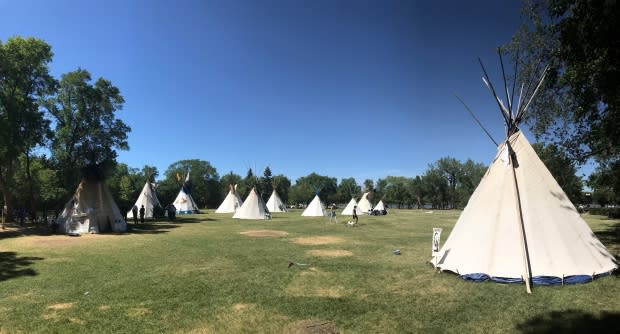
CBC asked representatives from both camps to reflect on their experiences.
Garret C Smith is from from the Piikani Nation. He is the Founder of Mohkinstsis Healing Camp in downtown Calgary.
Robyn Pitawanakwat is an Anishnaabe person and a member of Whitefish River First Nation. She is a community advocate in the areas of social justice and anti-colonialism and one of the spokespeople for Colonialism No More and the Justice for our Stolen Children camp which stood in Regina.
Their responses have been edited for clarity.
CBC: What did you hope to achieve when you first started the camp?
Smith: To bring awareness to the numerous injustices and oppressive policies within the Canadian justice and governing systems toward First Nations. To highlight the crisis of negligence, evidence mishandling, improper investigation tactics and obvious sentencing differentials against First Nations youth.
Pitawanakwat: The goal of setting the camp up was to shine a light on the many injustices faced by Indigenous youth across Canada and the prairies, specifically in Saskatchewan.
What did you find yourself doing that you didn't expect?
Smith: Everything we are doing now. Creating initiatives to assist with community building, youth engagement, homeless support, education, healing, community garden(s), advocacy and resource referral.
Having the freedom to explore positive solutions, from First Nations perspectives, to tackle the modern issue of addictions within the urban First Nations community.
The ability and support to plant roots and engage the community in a uniquely First Nations model without fear of recourse.
Creating job opportunities by building networks of support between individuals and the various resource centres currently available.
Saving lives by holding space for an individual to feel safe and express their feelings without being judged. We have had two individuals that credit the camp and our networks for healing to save their own life and pull them away from thoughts of suicide.
We are building a community here, employing the traditional models of cultural behavior and principles held within our spirituality.
Pitawanakwat: The camp was set up as a calling out of the Provincial Government, but became a place of healing, support and advocacy for families who brought their stories forward.
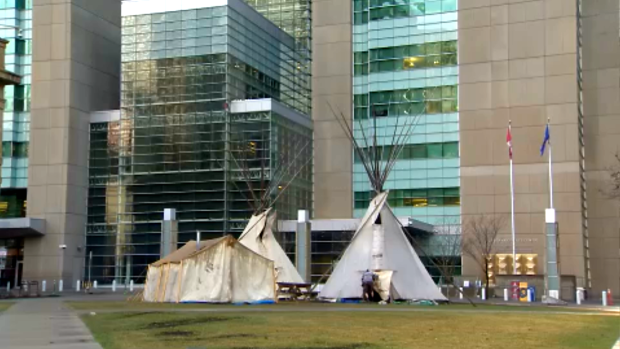
What kind of response did you get from the broader community?
Smith: Shockingly positive.
Community donations of various clothing items for the homeless, food and firewood for the camp are constant.
Local Elementary Schools have reached out to develop an educational engagement program for the kids and the camp.
Notably, Thorncliffe School has contacted me to pursue an artist-in-residence spot.
Cash donations for our online 'Tipi Fundraiser' are helping us reach our goal of having four teepees onsite. We currently have two, with funds raised to purchase one and the other having been gifted to us.
Pitawanakwat: The broader community was predominantly very supportive. We had all kinds of donations coming in regularly. The majority of people coming through camp were met with warmth and we answered many questions and had great conversations over the many months that camp was set up.
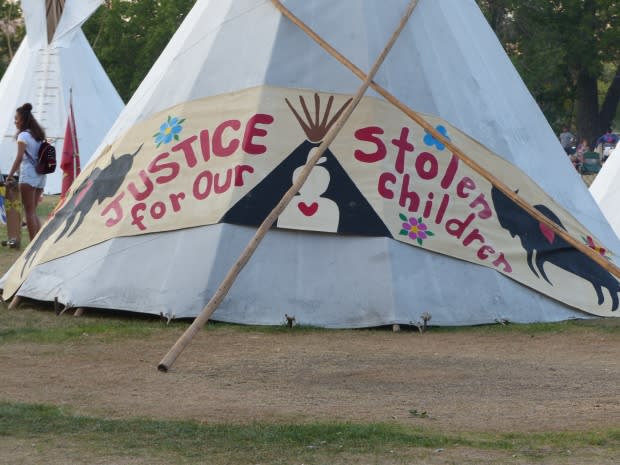
How would you describe your interactions with police?
Smith: Minimal.
They monitor us, yet instead of feeling negligent, their absence feels supportive.
There is a complete lack of harassment from the local police service. Those that do stop by the camp do so to generally introduce themselves and show a sense of support and solidarity.
The Indigenous Liaison has done a tremendous job providing proper communication between our camp and the CPS.
They understand our intentions here are peaceful and add to the community.
Pitawanakwat: Our interactions with the police were mostly uneventful. After the aggressive arrests of June 18th to clear the camp for the upcoming Canada Day celebrations, the police seemed aware of the bad optics (for them) of arresting grieving parents and grandparents who want answers in the death of their child.
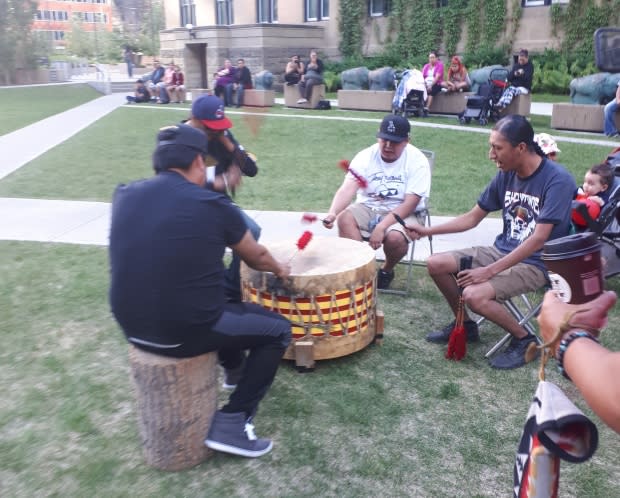
What kind of interactions have you had with politicians and elected officials?
Smith: A few local MLA's have shown support, gifting us coffee and snacks. The provincial Minister of Indigenous Relations invited me to his Calgary office for a meeting and show of support.
Most significant is the Provincial Court Judge who invited us up to his office, encouraged us to shadow him for a day in the courts and was kind enough to offer me the use of his office shower should I ever need.
The support is similar to the Police. They keep their distance, but those that do stop by express a sense of connection and appreciation for our efforts here.
Pitawanakwat: We've met with many levels of government. Of course, the least receptive is the one whose practices and policies we're calling out. Our July 2nd meeting in Fort Qu'Appelle showed that quite clearly.
What kind of relationship did/does your camp have with the space it is located in?
Smith: Great. Local groundskeepers actually help us take out our garbage to keep the space clean.
Local businesses allow us the use of their washrooms, many going as far as to donate their leftover food items.
Passerbys have accepted our presence with many walking by and giving us a simple smile as opposed to the side-eyed stares we would first receive.
We received one incident of vandalism that was minor and quickly resolved early in our occupation. For the past 4 months, we have been free of any negativity impacting the camp's facilities.
Pitawanakwat: The space we were located on is crown land and under treaty is a shared use space. It's a space that is visible as you cross a bridge that flies Treaty Four flags for most of the year and it is in the face of the very conservative government whose policies are deeply impacting families and youth on a daily basis.
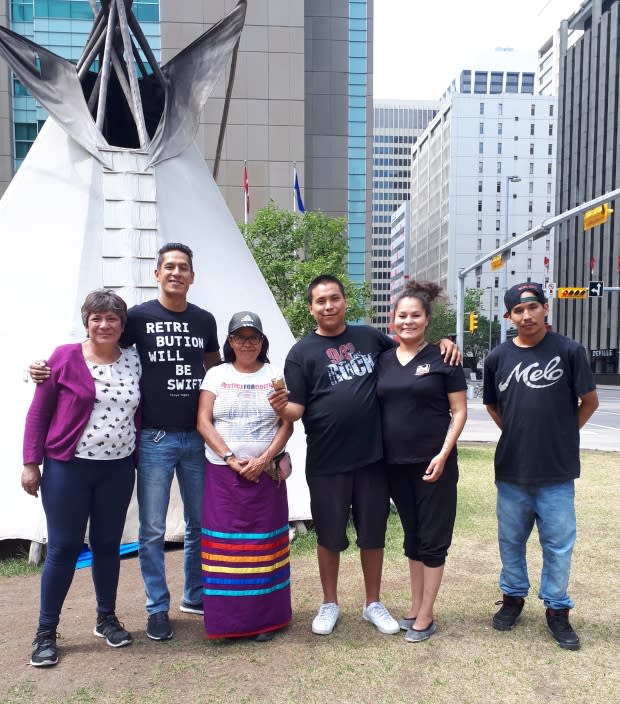
What have you learned about your province through this experience?
Smith: That there is hope. Simply that.
It's still very racist here in the "Texas of Canada," but the level of support and lack of authoritative harassment has given light to the possibility that we may finally be accepted as the ones who hold the deepest roots to this land.
Our knowledge is being acknowledged and modern sciences are finally catching up with First Nations spirituality. We know how to live with the land and people are beginning to realize that.
I initially left this area because it was unsupportive and racist. I lived in Toronto for 9 years.
Now that I've matured and returned to my traditional teachings, I can see that with the right network of people, we can build a new system of support. Even here in Alberta.
Pitawanakwat: We've learned many of the child welfare policies and how they don't align with practices. We've learned how Social Services here doesn't require registered social workers so there is very little recourse for problematic 'child protection workers' that exist throughout the system.
This is a theme throughout Saskatchewan government. There's little to no oversight when the state is mistreating citizens.
This column is part of CBC's Opinion section. For more information about this section, please read this editor's blog and our FAQ.

